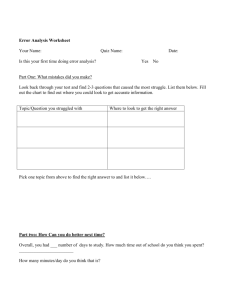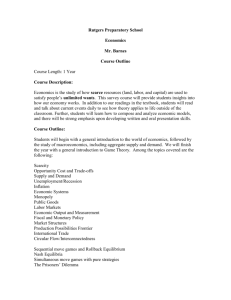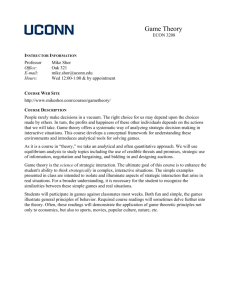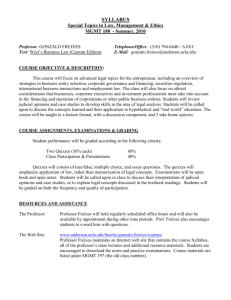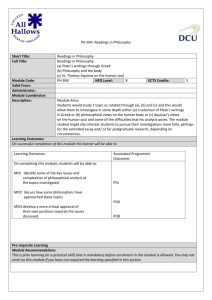Phil 1000 fall 2012 syllabus
advertisement
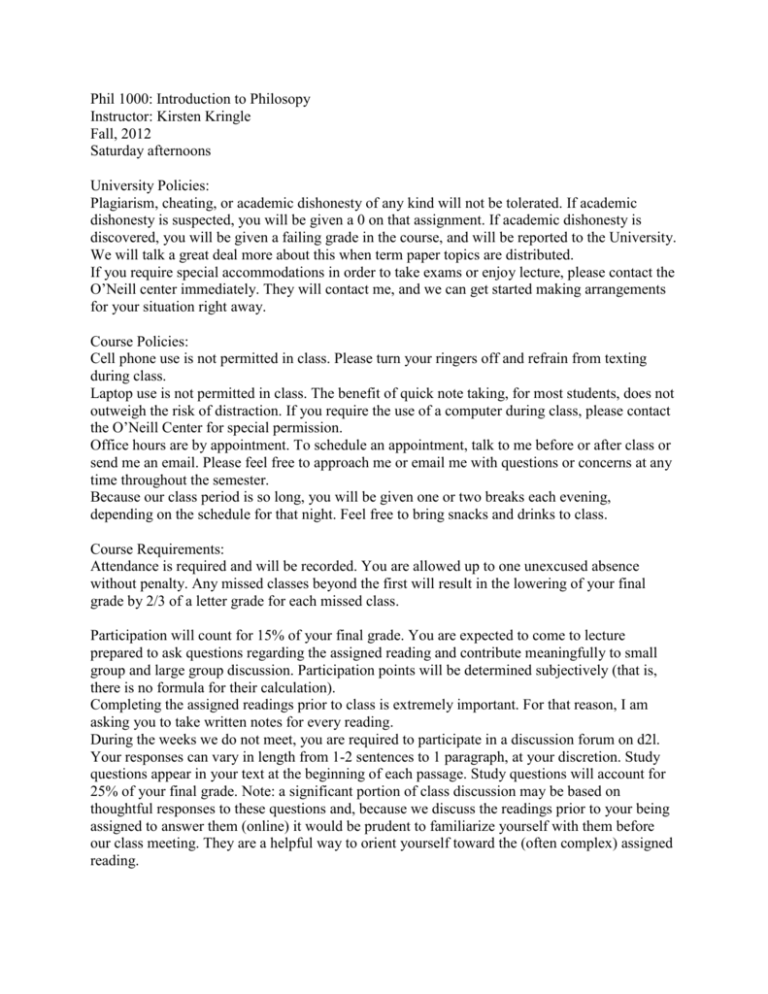
Phil 1000: Introduction to Philosopy Instructor: Kirsten Kringle Fall, 2012 Saturday afternoons University Policies: Plagiarism, cheating, or academic dishonesty of any kind will not be tolerated. If academic dishonesty is suspected, you will be given a 0 on that assignment. If academic dishonesty is discovered, you will be given a failing grade in the course, and will be reported to the University. We will talk a great deal more about this when term paper topics are distributed. If you require special accommodations in order to take exams or enjoy lecture, please contact the O’Neill center immediately. They will contact me, and we can get started making arrangements for your situation right away. Course Policies: Cell phone use is not permitted in class. Please turn your ringers off and refrain from texting during class. Laptop use is not permitted in class. The benefit of quick note taking, for most students, does not outweigh the risk of distraction. If you require the use of a computer during class, please contact the O’Neill Center for special permission. Office hours are by appointment. To schedule an appointment, talk to me before or after class or send me an email. Please feel free to approach me or email me with questions or concerns at any time throughout the semester. Because our class period is so long, you will be given one or two breaks each evening, depending on the schedule for that night. Feel free to bring snacks and drinks to class. Course Requirements: Attendance is required and will be recorded. You are allowed up to one unexcused absence without penalty. Any missed classes beyond the first will result in the lowering of your final grade by 2/3 of a letter grade for each missed class. Participation will count for 15% of your final grade. You are expected to come to lecture prepared to ask questions regarding the assigned reading and contribute meaningfully to small group and large group discussion. Participation points will be determined subjectively (that is, there is no formula for their calculation). Completing the assigned readings prior to class is extremely important. For that reason, I am asking you to take written notes for every reading. During the weeks we do not meet, you are required to participate in a discussion forum on d2l. Your responses can vary in length from 1-2 sentences to 1 paragraph, at your discretion. Study questions appear in your text at the beginning of each passage. Study questions will account for 25% of your final grade. Note: a significant portion of class discussion may be based on thoughtful responses to these questions and, because we discuss the readings prior to your being assigned to answer them (online) it would be prudent to familiarize yourself with them before our class meeting. They are a helpful way to orient yourself toward the (often complex) assigned reading. Weekly quizzes will be administered at the beginning of each class. These quizzes will be drawn primarily from your study questions and the “to think about” questions appearing at the end of each text, as well as from the text itself. Late and make up quizzes will not be offered (you must therefore be on time to class to take the quiz). Quizzes will account for 25% of your final grade. You will be required to write one term paper, of approximately 8-10 pages in length. Your term paper will be due on our final day of class. Late papers will not be accepted. You will receive term paper topics, as well as more detailed instructions regarding this assignment in early in the course. Your paper should be a work in progress throughout the course. I do not expect you to write a 10 page paper in the last week, and discourage you from doing so. Your term paper will be worth 35% of your final grade. Course Description: This course proposes to cover wide ranging issues across the discipline of philosophy. We will begin with a look at what counts as philosophy, and what it is to do philosophy. We consider the arguments for and against the existence of god. We will discuss epistemology, or the study of knowledge, and metaphysics, or the study of what is.We will have an extensive investigation of ethical theories including utilitarianism, Kantian, virtue ethics, and other more nontraditional approaches. We will also discuss social and political philosophy, a branch of moral philosophy concerned with government. Overall, this course is aimed towards helping you acquire an appreciation for philosophical issues and critical thought. But doing philosophy also helps one develop practical skills. This course will teach you how to identify and evaluate the reasoning underlying difficult pieces of writing. It will also help you learn to communicate more effectively, and to write and speak more convincingly. Studying philosophy will encourage you to be open-minded towards new and challenging ideas. And to top it off, philosophy is fascinating, intellectually fulfilling, and yes, lots of fun! Course Schedule (Gentle Reminder: Readings are required to be completed prior to class and quizzes are administered at the beginning of class) 9/8 Topic: Introduction to the course, introduction to philosophy, Plato and the founding myth of philosophy Readings: None Assignments due: None 9/15 online 9/22 Topic: Introduction to ethical theories Readings: #14, #15, #16 Assignments due: Quiz 9/29 Online 10/6 Topic: Ethics Continued Readings: #17, #18, #19 Assignments due: quiz 10/13 Online 10/20 Topic: Paper Readings: None Assignments due: None 10/27 Online 11/3 Topic: Epistemology and Metaphysics Readings: #24, #27, #28, #29 Assignments due: Quiz 11/10 Online 11/17 Topic: Epistemology and Metaphysics Readings: #34, #36, #37, #38 Assignments due: Quiz 11/24 Online 12/1 Topic: Philosophy and Religion Readings: #3, #4, #5. #6 Assignments due: quiz 12/8 Online 12/15 Topic: Social and Political Readings: #43, #44, 45 Assignments due: quiz, final papers due
